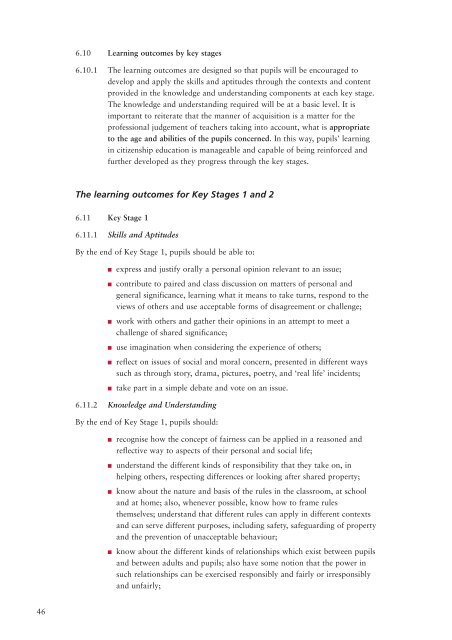Education for citizenship and the teaching of democracy in schools
Education for citizenship and the teaching of democracy in schools
Education for citizenship and the teaching of democracy in schools
You also want an ePaper? Increase the reach of your titles
YUMPU automatically turns print PDFs into web optimized ePapers that Google loves.
6.10 Learn<strong>in</strong>g outcomes by key stages<br />
6.10.1 The learn<strong>in</strong>g outcomes are designed so that pupils will be encouraged to<br />
develop <strong>and</strong> apply <strong>the</strong> skills <strong>and</strong> aptitudes through <strong>the</strong> contexts <strong>and</strong> content<br />
provided <strong>in</strong> <strong>the</strong> knowledge <strong>and</strong> underst<strong>and</strong><strong>in</strong>g components at each key stage.<br />
The knowledge <strong>and</strong> underst<strong>and</strong><strong>in</strong>g required will be at a basic level. It is<br />
important to reiterate that <strong>the</strong> manner <strong>of</strong> acquisition is a matter <strong>for</strong> <strong>the</strong><br />
pr<strong>of</strong>essional judgement <strong>of</strong> teachers tak<strong>in</strong>g <strong>in</strong>to account, what is appropriate<br />
to <strong>the</strong> age <strong>and</strong> abilities <strong>of</strong> <strong>the</strong> pupils concerned. In this way, pupils’ learn<strong>in</strong>g<br />
<strong>in</strong> <strong>citizenship</strong> education is manageable <strong>and</strong> capable <strong>of</strong> be<strong>in</strong>g re<strong>in</strong><strong>for</strong>ced <strong>and</strong><br />
fur<strong>the</strong>r developed as <strong>the</strong>y progress through <strong>the</strong> key stages.<br />
The learn<strong>in</strong>g outcomes <strong>for</strong> Key Stages 1 <strong>and</strong> 2<br />
6.11 Key Stage 1<br />
6.11.1 Skills <strong>and</strong> Aptitudes<br />
By <strong>the</strong> end <strong>of</strong> Key Stage 1, pupils should be able to:<br />
■<br />
■<br />
■<br />
■<br />
■<br />
■<br />
express <strong>and</strong> justify orally a personal op<strong>in</strong>ion relevant to an issue;<br />
contribute to paired <strong>and</strong> class discussion on matters <strong>of</strong> personal <strong>and</strong><br />
general significance, learn<strong>in</strong>g what it means to take turns, respond to <strong>the</strong><br />
views <strong>of</strong> o<strong>the</strong>rs <strong>and</strong> use acceptable <strong>for</strong>ms <strong>of</strong> disagreement or challenge;<br />
work with o<strong>the</strong>rs <strong>and</strong> ga<strong>the</strong>r <strong>the</strong>ir op<strong>in</strong>ions <strong>in</strong> an attempt to meet a<br />
challenge <strong>of</strong> shared significance;<br />
use imag<strong>in</strong>ation when consider<strong>in</strong>g <strong>the</strong> experience <strong>of</strong> o<strong>the</strong>rs;<br />
reflect on issues <strong>of</strong> social <strong>and</strong> moral concern, presented <strong>in</strong> different ways<br />
such as through story, drama, pictures, poetry, <strong>and</strong> ‘real life’ <strong>in</strong>cidents;<br />
take part <strong>in</strong> a simple debate <strong>and</strong> vote on an issue.<br />
6.11.2 Knowledge <strong>and</strong> Underst<strong>and</strong><strong>in</strong>g<br />
By <strong>the</strong> end <strong>of</strong> Key Stage 1, pupils should:<br />
■<br />
■<br />
■<br />
■<br />
recognise how <strong>the</strong> concept <strong>of</strong> fairness can be applied <strong>in</strong> a reasoned <strong>and</strong><br />
reflective way to aspects <strong>of</strong> <strong>the</strong>ir personal <strong>and</strong> social life;<br />
underst<strong>and</strong> <strong>the</strong> different k<strong>in</strong>ds <strong>of</strong> responsibility that <strong>the</strong>y take on, <strong>in</strong><br />
help<strong>in</strong>g o<strong>the</strong>rs, respect<strong>in</strong>g differences or look<strong>in</strong>g after shared property;<br />
know about <strong>the</strong> nature <strong>and</strong> basis <strong>of</strong> <strong>the</strong> rules <strong>in</strong> <strong>the</strong> classroom, at school<br />
<strong>and</strong> at home; also, whenever possible, know how to frame rules<br />
<strong>the</strong>mselves; underst<strong>and</strong> that different rules can apply <strong>in</strong> different contexts<br />
<strong>and</strong> can serve different purposes, <strong>in</strong>clud<strong>in</strong>g safety, safeguard<strong>in</strong>g <strong>of</strong> property<br />
<strong>and</strong> <strong>the</strong> prevention <strong>of</strong> unacceptable behaviour;<br />
know about <strong>the</strong> different k<strong>in</strong>ds <strong>of</strong> relationships which exist between pupils<br />
<strong>and</strong> between adults <strong>and</strong> pupils; also have some notion that <strong>the</strong> power <strong>in</strong><br />
such relationships can be exercised responsibly <strong>and</strong> fairly or irresponsibly<br />
<strong>and</strong> unfairly;<br />
46


